新概念英语第二册:第14课课文详解及语法解析
- 格式:docx
- 大小:8.56 KB
- 文档页数:4
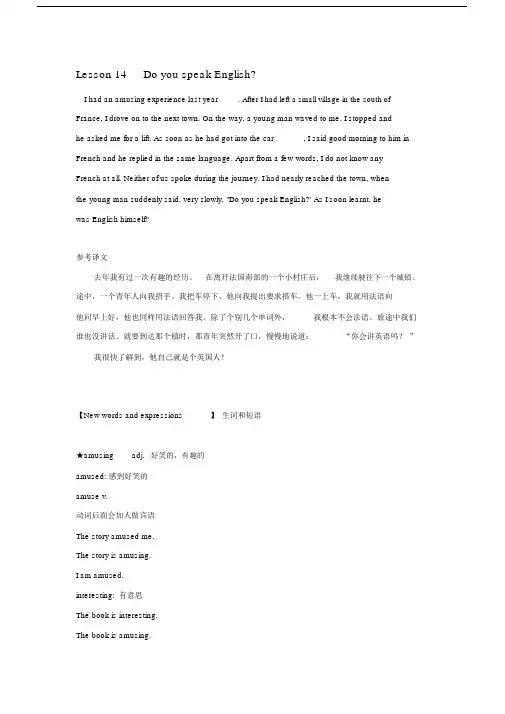
Lesson 14 Do you speak English?I had an amusing experience last year. After I had left a small village in the south of France, I drove on to the next town. On the way, a young man waved to me. I stopped andhe asked me for a lift. As soon as he had got into the car, I said good morning to him in French and he replied in the same language. Apart from a few words, I do not know anyFrench at all. Neither of us spoke during the journey. I had nearly reached the town, whenthe young man suddenly said, very slowly, "Do you speak English?' As I soon learnt, hewas English himself!'参考译文去年我有过一次有趣的经历。
在离开法国南部的一个小村庄后,我继续驶往下一个城镇。
途中,一个青年人向我招手。
我把车停下,他向我提出要求搭车。
他一上车,我就用法语向他问早上好,他也同样用法语回答我。
除了个别几个单词外,我根本不会法语。
旅途中我们谁也没讲话。
就要到达那个镇时,那青年突然开了口,慢慢地说道:“你会讲英语吗?”我很快了解到,他自己就是个英国人!【New words and expressions】生词和短语★amusing adj.好笑的,有趣的amused: 感到好笑的amuse v.动词后面会加人做宾语The story amused me.The story is amusing.I am amused.interesting: 有意思The book is interesting.The book is amusing.funny: 好笑的,可以指,开心的,令人开心的interesting/funny story★experience n.、体:不可数名、感受:可数名He has a lot of experience. He has a lot of experiences.Experience is the best teacher .是最好的老。
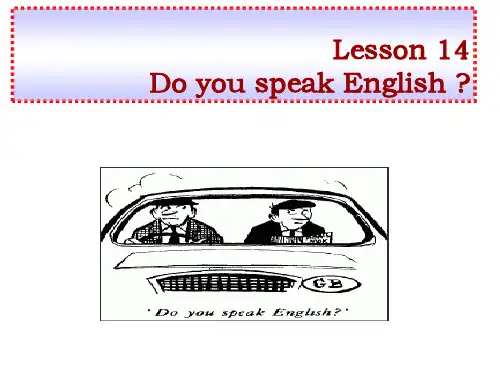
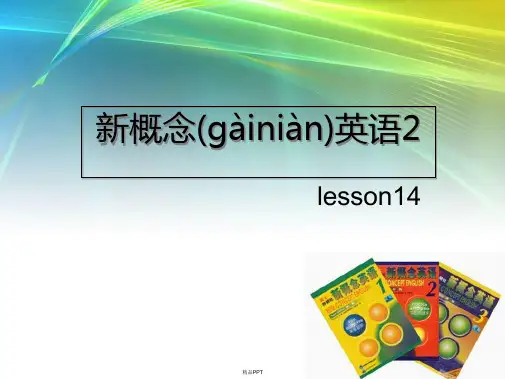
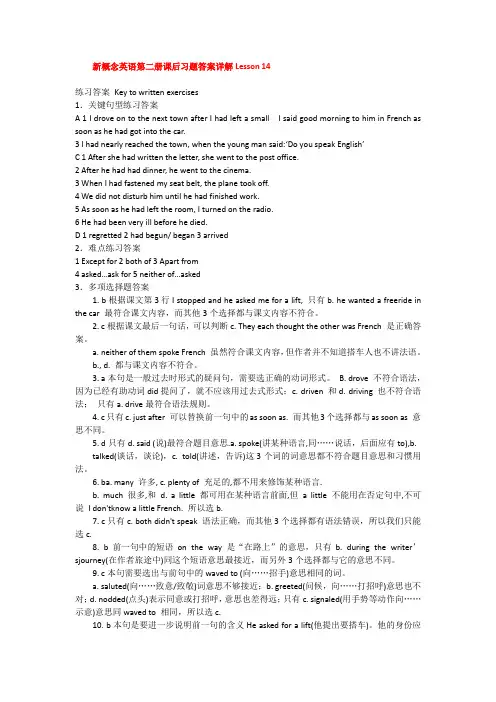
新概念英语第二册课后习题答案详解Lesson 14练习答案Key to written exercises1.关键句型练习答案A 1 I drove on to the next town after I had left a small I said good morning to him in French as soon as he had got into the car.3 I had nearly reached the town, when the young man said:‘Do you speak English’C 1 After she had written the letter, she went to the post office.2 After he had had dinner, he went to the cinema.3 When I had fastened my seat belt, the plane took off.4 We did not disturb him until he had finished work.5 As soon as he had left the room, I turned on the radio.6 He had been very ill before he died.D 1 regretted 2 had begun/ began 3 arrived2.难点练习答案1 Except for2 both of3 Apart from4 asked…ask for5 neither of…asked3.多项选择题答案1. b根据课文第3行I stopped and he asked me for a lift, 只有b. he wanted a freeride in the car 最符合课文内容,而其他3个选择都与课文内容不符合。
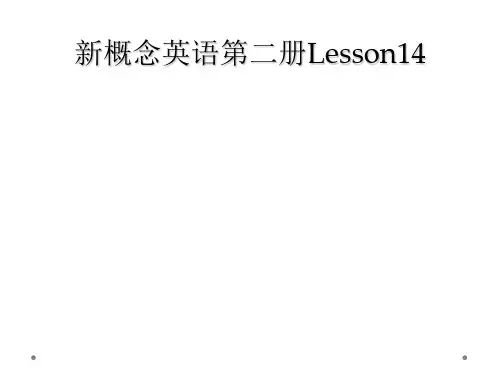
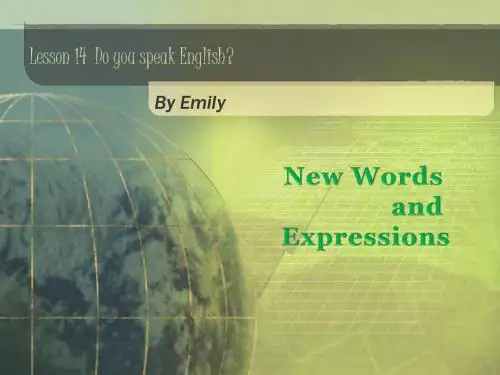
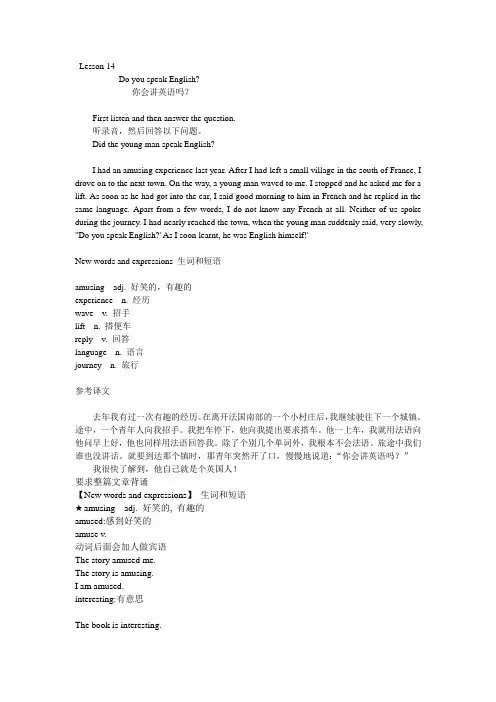
Lesson 14Do you speak English?你会讲英语吗?First listen and then answer the question.听录音,然后回答以下问题。
Did the young man speak English?I had an amusing experience last year. After I had left a small village in the south of France, I drove on to the next town. On the way, a young man waved to me. I stopped and he asked me for a lift. As soon as he had got into the car, I said good morning to him in French and he replied in the same language. Apart from a few words, I do not know any French at all. Neither of us spoke during the journey. I had nearly reached the town, when the young man suddenly said, very slowly, "Do you speak English?' As I soon learnt, he was English himself!'New words and expressions 生词和短语amusing adj. 好笑的,有趣的experience n. 经历wave v. 招手lift n. 搭便车reply v. 回答language n. 语言journey n. 旅行参考译文去年我有过一次有趣的经历。
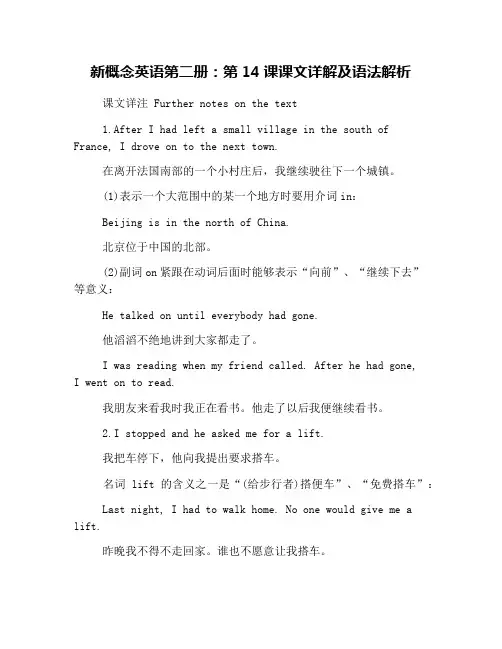
新概念英语第二册:第14课课文详解及语法解析课文详注 Further notes on the text1.After I had left a small village in the south of France, I drove on to the next town.在离开法国南部的一个小村庄后,我继续驶往下一个城镇。
(1)表示一个大范围中的某一个地方时要用介词in:Beijing is in the north of China.北京位于中国的北部。
(2)副词on紧跟在动词后面时能够表示“向前”、“继续下去”等意义:He talked on until everybody had gone.他滔滔不绝地讲到大家都走了。
I was reading when my friend called. After he had gone,I went on to read.我朋友来看我时我正在看书。
他走了以后我便继续看书。
2.I stopped and he asked me for a lift.我把车停下,他向我提出要求搭车。
名词lift的含义之一是“(给步行者)搭便车”、“免费搭车”:Last night, I had to walk home. No one would give me a lift.昨晚我不得不走回家。
谁也不愿意让我搭车。
I was lucky today. I got a lift soon after I had leftthe village.我今天运气好,离开村子不久就搭上了便车。
3.As soon as he had got into the car, I said goodmorning to him in French and he replied in the same language.他一上车,我就用法语向他问早上好,他也同样用法语回答我。
(1)表示时间的固定短语as soon as通常表示“一……就……”,即两个动词之间相隔时间非常短:Tell him the news as soon as you meet him.你一遇见他就把这消息告诉他。
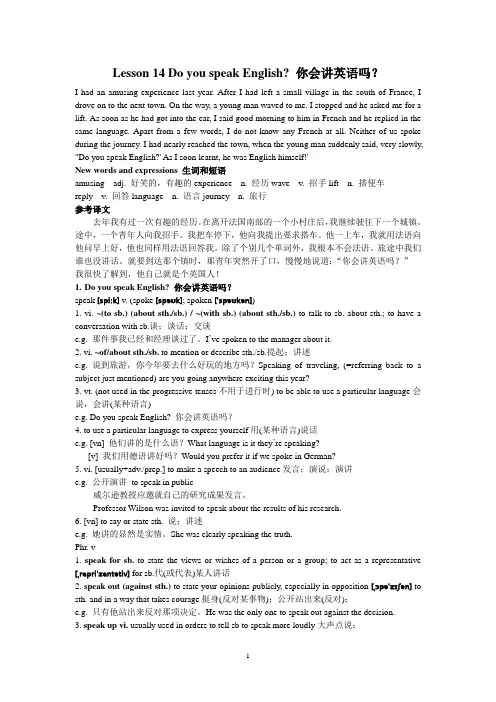
Lesson 14 Do you speak English? 你会讲英语吗?I had an amusing experience last year. After I had left a small village in the south of France, I drove on to the next town. On the way, a young man waved to me. I stopped and he asked me for a lift. As soon as he had got into the car, I said good morning to him in French and he replied in the same language. Apart from a few words, I do not know any French at all. Neither of us spoke during the journey. I had nearly reached the town, when the young man suddenly said, very slowly, "Do you speak English?' As I soon learnt, he was English himself!'New words and expressions 生词和短语amusing adj. 好笑的,有趣的experience n. 经历wave v. 招手lift n. 搭便车reply v. 回答language n. 语言journey n. 旅行参考译文去年我有过一次有趣的经历。
在离开法国南部的一个小村庄后,我继续驶往下一个城镇。
途中,一个青年人向我招手。
我把车停下,他向我提出要求搭车。
他一上车,我就用法语向他问早上好,他也同样用法语回答我。
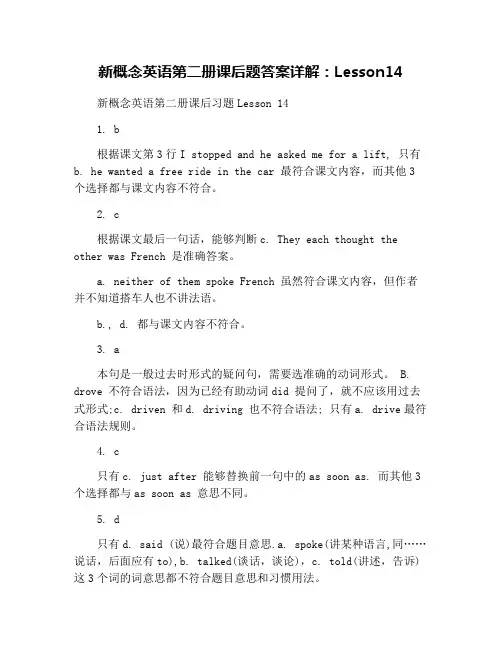
新概念英语第二册课后题答案详解:Lesson14新概念英语第二册课后习题Lesson 141. b根据课文第3行I stopped and he asked me for a lift, 只有b. he wanted a free ride in the car 最符合课文内容,而其他3个选择都与课文内容不符合。
2. c根据课文最后一句话,能够判断c. They each thought the other was French 是准确答案。
a. neither of them spoke French 虽然符合课文内容,但作者并不知道搭车人也不讲法语。
b., d. 都与课文内容不符合。
3. a本句是一般过去时形式的疑问句,需要选准确的动词形式。
B. drove 不符合语法,因为已经有助动词did 提问了,就不应该用过去式形式;c. driven 和d. driving 也不符合语法; 只有a. drive最符合语法规则。
4. c只有c. just after 能够替换前一句中的as soon as. 而其他3个选择都与as soon as 意思不同。
5. d只有d. said (说)最符合题目意思.a. spoke(讲某种语言,同……说话,后面应有to),b. talked(谈话,谈论),c. told(讲述,告诉)这3个词的词意思都不符合题目意思和习惯用法。
6. ba. many 很多, c. plenty of 充足的,都不用来修饰某种语言.b. much 很多,和 d. a little 都可用在某种语言前面,但 alittle 不能用在否定句中,不可说 I don't know a little French.所以选b.7. c只有c. both didn't speak 语法准确,而其他3个选择都有语法错误,所以我们只能选c.8. b前一句中的短语on the way 是“在路上”的意思,只有b.during the writer’s journey(在作者旅途中)同这个短语意思最接近,而另外3个选择都与它的意思不同。
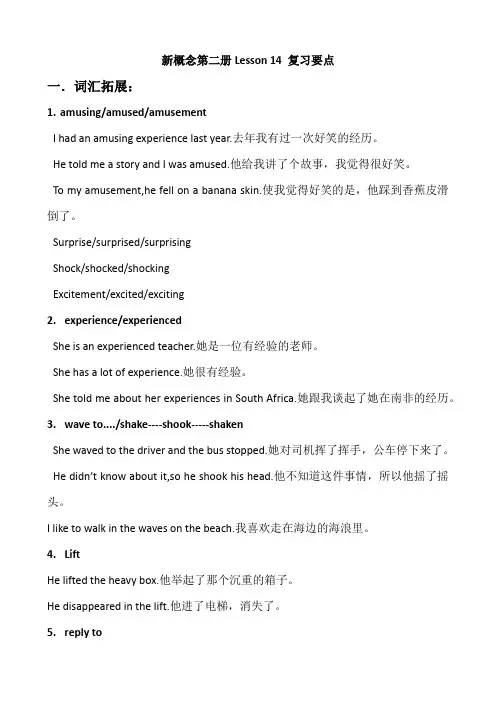
新概念第二册Lesson 14 复习要点一.词汇拓展:1.amusing/amused/amusementI had an amusing experience last year.去年我有过一次好笑的经历。
He told me a story and I was amused.他给我讲了个故事,我觉得很好笑。
To my amusement,he fell on a banana skin.使我觉得好笑的是,他踩到香蕉皮滑倒了。
Surprise/surprised/surprisingShock/shocked/shockingExcitement/excited/exciting2.experience/experiencedShe is an experienced teacher.她是一位有经验的老师。
She has a lot of experience.她很有经验。
She told me about her experiences in South Africa.她跟我谈起了她在南非的经历。
3.wave to..../shake----shook-----shakenShe waved to the driver and the bus stopped.她对司机挥了挥手,公车停下来了。
He didn’t know about it,so he shook his head.他不知道这件事情,所以他摇了摇头。
I like to walk in the waves on the beach.我喜欢走在海边的海浪里。
4.LiftHe lifted the heavy box.他举起了那个沉重的箱子。
He disappeared in the lift.他进了电梯,消失了。
5.reply toYou didn’t reply to my letter.你没有回我的信。
I didn’t receive your reply.我没有收到你的回复。
新概念英语二-----------------LESSON 14重点词组:have an experience 有……经历in the south of 在南方on the way to 在去……的路上wave to 招手ask for a lift 要求搭车as soon as 一……就……get into 进入say… to… 跟……说……in French 用法语apart from 除了……以外not … at all 一点也不neither of 两者都不in the same language 用同样的语言语法点:1. After I had left a small village in the south of France,I drove on to the next town.a. 表示一个大范围中的某一个地方时要用介词inBeijing is in the north of China. 北京位于中国的北部。
b. 副词on紧跟在动词后面时可以表示“向前”、“继续下去”等意义He talked on until everybody had gone. 他滔滔不绝地讲到大家都走了。
2. I stopped and he asked me for a lift. 名词lift的含义之一是“(给步行者)搭便车”、“免费搭车”I got a lift soon after I had left the village. 离开村子不久我就搭上了便车。
3.As soon as he had got into the car,I said good morning to him in French and he replied in the same language.他一上车,我就用法语向他问早上好,他也同样用法语回答我。
a. 表示时间的固定短语as soon as通常表示“一….就…”,即两个动词之间相隔时间非常短Tell him the news as soon as you meet him. 你一遇见他就把这消息告诉他。
(完整版)新概念英语第二册:第14课课文详解及语法解析新概念英语第二册:第14课课文详解及语法解析课文详注Further notes on the text1.After I had left a small village in the south of France, I drove on to the next town.在离开法国南部的一个小村庄后,我继续驶往下一个城镇。
(1)表示一个大范围中的某一个地方时要用介词in:Beijing is in the north of China.北京位于中国的北部。
(2)副词on紧跟在动词后面时能够表示“向前”、“继续下去”等意义:He talked on until everybody had gone.他滔滔不绝地讲到大家都走了。
I was reading when my friend called. After he had gone,I went on to read.我朋友来看我时我正在看书。
他走了以后我便继续看书。
2.I stopped and he asked me for a lift.我把车停下,他向我提出要求搭车。
名词lift的含义之一是“(给步行者)搭便车”、“免费搭车”:Last night, I had to walk home. No one would give me a lift.昨晚我不得不走回家。
谁也不愿意让我搭车。
I was lucky today. I got a lift soon after I had leftthe village.我今天运气好,离开村子不久就搭上了便车。
3.As soon as he had got into the car, I said goodmorning to him in French and he replied in the same language.他一上车,我就用法语向他问早上好,他也同样用法语回答我。
新概念英语第二册重点语法句型第14课一、重要句型或语法1、过去完成时表示过去发生的动作对过去造成的影响或结果。
如:He had finished his job before the boss came back. 本课新出现了had nearly done...when...的句型,如:I had nearly reached home when it began to rain heavily.二、课文主要语言点I had an amusing experience last year. 1)have an experience,有...的经历。
注意experience表经历时,是可数名词;表经验时,是不可数的。
2)amusing,好笑的,来自amuse,使开心。
After I had left a small village in the south of France,I drove on to the next town. 1)可提问学生为什么句中的leave要用过去完成时。
2)the south of France,发过的南部。
可引出the south of China(中国南部)与South China(华南)的区别。
On the way, a young man waved to me. 1)on the way,在路上,此处用逗号与后文隔开,能够凸显后文。
2)wave to sb.,想某人招手示意。
I stopped and he asked me for a lift. ask sb. for a lift,向某人要求搭车。
As soon as he had got into the car, I said good morningto him in French and he replied in the same language. 1)可提问学生get into为何使用过去完成时。
新概念英语第二册:第14 课课文详解及语法解析课文详注Further notes on the text
1.After I had left a small village in the south of France, I drove on to the next town.
在离开法国南部的一个小村庄后,我继续驶往下一个城镇。
(1) 表示一个大范围中的某一个地方时要用介词in :
Beijing is in the north of China. 北京位于中国的北部。
(2) 副词on 紧跟在动词后面时能够表示“向前”、“继续下去” 等意义:
He talked on until everybody had gone. 他滔滔不绝地讲到大家都走
了。
I was reading when my friend called. After he had gone, I went on to read.
我朋友来看我时我正在看书。
他走了以后我便继续看书。
2.I stopped and he asked me for a lift.
我把车停下,他向我提出要求搭车。
名词lift 的含义之一是“ ( 给步行者) 搭便车”、“免费搭车”:
Last night, I had to walk home. No one would give me a
lift.
昨晚我不得不走回家。
谁也不愿意让我搭车
I was lucky today. I got a lift soon after I had left the village.
我今天运气好,离开村子不久就搭上了便车。
3.As soon as he had got into the car, I said good morning to him in French and he replied in the same language.
他一上车,我就用法语向他问早上好,他也同样用法语回答我。
(1) 表示时间的固定短语as soon as通常表示“一...... 就 ... ”
即两个动词之间相隔时间非常短:
Tell him the news as soon as you meet him. 你一遇见他就把这消息
告诉他。
(2) 表示用某种语言作为交际手段时介词用in ,表示讲某种语言时能够不加介:
speak English/ French 讲英语/ 法语That book is written in German. 那本书是用德语写的。
He replied the question in English. 他用英语回答了这个问题。
语法Grammar in use 过去完成时(The simple past perfect tense) 过去完成时由had+ 过去分词构成,它表示过去某时或某动作发生之前已经完成的动作或情况,即“较早的过去”。
在用过去完成时态的句子中,常用的连词when, after, as soon
as, until, by that time 等:
When I woke up in the morning, she had already had her breakfast.
当我早上醒来时,她已经吃过早饭了。
After he had said goodbye to us all, Captain Alison started his journey.
当艾利森船长和我们大家都道了别之后,他就启程了。
Did you really ring the police?
你真的给警方打电话了?
It was a mistake. I realized it as soon as I had rung them.
我犯了个错误。
刚给他们打完电话我就意识到了。
I didn't know that she was a famous actress until you had told me.
直到你告诉我时我才知道她是位名演员。
常与现在完成时连用的副词如already, just, never,
never…before也常与过去完成时连用,以强调事件发生的先后次序: The boys loved the zoo. They had never seen wild animals before.
男孩们喜欢动物园,以前他们从没见过野兽。
在有些用过去完成时的句子中没有明确的时间状语,但通过上下文能够看出动作发生的先后:
The bus finally came. I had waited for 40 minutes.
公交车终于来了。
我已经等了40 分钟。